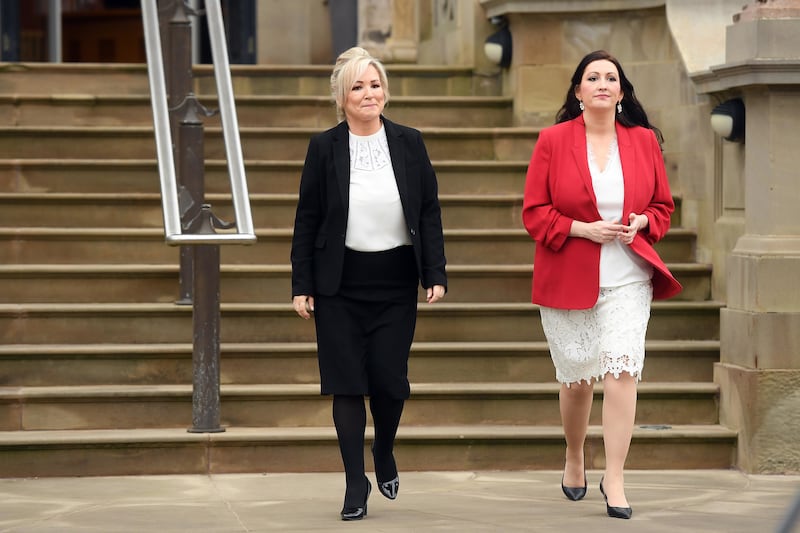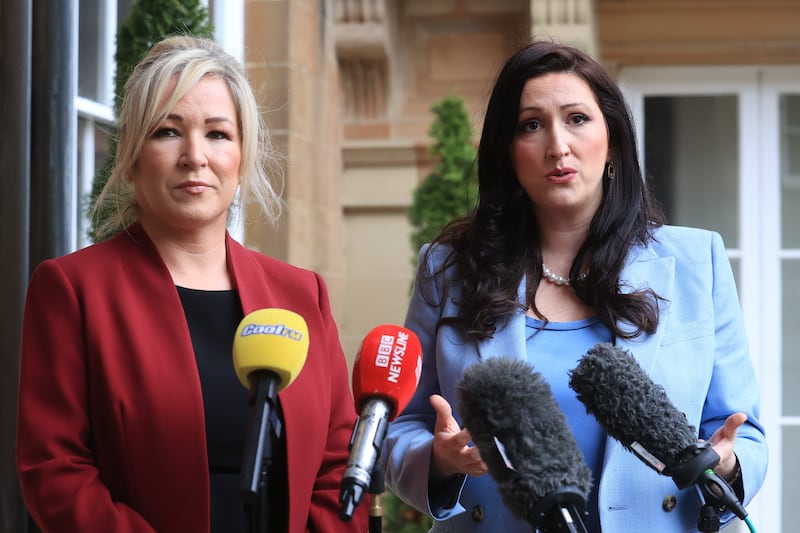THE north’s business community are well versed in operating without a functioning executive.
Three long years of dissolution finally ended in January 2020 with the New Decade, New Approach agreement. But the outbreak of a global pandemic in March 2020, all against the backdrop of Brexit, has made for an extremely challenging economic environment.
Now approaching the end of 2022 after seven months without a fully functioning executive, and with a recession on the way, what are the biggest issues facing the north’s business community?
Read more:Stormont crisis - 'Shameful decline of education funding a result of political choice'
Ann McGregor, chief executive of the Northern Ireland Chamber of Commerce and Industry (NI Chamber)
“RIGHT now, we are seeing the cumulative impact of no agreed budget, coupled with the prolonged absence of strategic decision making on difficult issues by local ministers. The Secretary of State’s recent statement on the shape of the public finances was stark confirmation of that.
“Prices are right at the heart of business concerns. Supply chain issues are continuing to drive costs, alongside an energy crisis and a 41-year high inflation level. While restoring an Executive may not solve all the problems, its absence makes things worse as the in-tray of overdue reforms and resultant crises continues to grow.
“We urgently need an Executive back in place to get the public finances in order. Until we finally address the fiscal challenges in health, education and infrastructure, citizens will continue to suffer from sub-optimal services and there will be fewer resources year-on-year to focus on economic growth and job creation.”
Glyn Roberts, chief executive of Retail NI:
“WE are not just dealing with a cost-of-living crisis, we are also facing a cost of business crisis too. An immediate priority is the restoration of the business rates holiday to support independent retailers and hospitality businesses through the next six difficult months.
“Another top priority in our report is establishing a rural town and village infrastructure investment fund to ensure our small and mid-sized town are not left behind.
“With the review of Invest NI ongoing, Retail NI wants to see the Executive create a new small business champion to head a new agency which will focus on micro and small business development and be a ‘one stop shop’ for those seeking to start up on their own.”
Colin Neill, chief executive, Hospitality Ulster
“WHILST many economic levers that can assist the hospitality sector here are within the gift of Westminster, such as the setting of the VAT rate, we need to see the Assembly and Executive back on its feet as soon as possible.
“First things first, we need a multi-annual budget to bring some stability to economic planning, we need a programme for government to bring some shape to the direction of travel, and most importantly, we need to see a dedicated hospitality strategy that cuts across a number of departments.
“The entire hospitality industry is getting it from both ends at the minute on business costs and the impact of cost of living. It is such a huge driver of the local economy that it needs to be protected and enhanced.
“With a dedicated strategy like our counter parts in Great Britain, a restored Executive could see a renewed effort for the sector with Ministers delivering practical support to protect businesses before things get worse in the new year.”
Stephen Kelly, chief executive of Manufacturing NI
“WE need an overhaul of how energy generators are rewarded so that consumers not extreme profits comes first, we need to sort the route from education to training to employment, we need government spending on procurement and infrastructure delivered locally to insulate us from recession and, as someone who has time to count the thousands of cones on the A6 for instance, we need a minister driving performance in the departments and the scrutiny of the committees to hold everyone to account.
“Finally, a healthy community needs a healthy economy and vice versa. One-in-four people on a waiting list is also one-in-four in our workforce. Sorting the health service is not just an issue for individuals, families and households but for our employers too.”
Roger Pollen, head of the Federation of Small Businesses (FSB) Northern Ireland
“THE most immediate priority must be cutting through the blame game around the distribution of energy support payments so that money gets rapidly into the hands of business owners and domestic customers alike at the point when need is becoming greatest.
“Next is the issue of childcare, which is akin to vital infrastructure as every nursery and childminder facilitates other people going to work, which keeps the whole economy afloat. “The sector is in crisis, with a number of providers collapsing in recent days but, whilst there are solutions to many of the problems it faces, the political vacuum is preventing these being adopted.
“Prompt payment of invoices by the public sector must be another top priority. And following close on the heels of these priorities must be setting a budget for next year that removes uncertainty for businesses and avoids hiking business rates, which are already amongst the highest anywhere in these islands.
“It would be utter folly to plug a short term Stormont budget shortfall by putting the dead hand of extra taxes businesses whilst they are in the midst of one of the worst cost of doing business crises ever seen.
“Stormont must not remain an unfilled space, going against the laws of nature and physics; it needs to be filled by an accountable individual or cohort, straining every sinew to deliver stability, good governance and predictability. Anything less is simply unforgivable.”

UFU president, David Brown
“THE absence of local government and ministers means that many much-needed strategic decisions for our agri-industry have been stalled preventing positive development, investment and growth.
“Bovine tuberculosis (bTB) is a major concern. We now have a once in a lifetime opportunity to address the disease and need an active minister who is committed to delivering the new eradication strategy.
“The cost-of-living crisis is continuing to put immense financial strain on rural families. The cost of food production continues to rise, and many farmers are struggling to absorb the extra costs. We need a devolved Government to step in and provide sustainability through much needed assistance including energy support for businesses.
“Climate change remains a top priority globally while trying to meet the demands of feeding a growing population, and farmers are a part of the solution. Agreement and leadership around the NI Executive is needed to help NI and support farmers on the journey towards net zero so they can help deliver extremely challenging climate change targets.
“Without an Agriculture, Environment and Rural Affairs Committee, we have lost the ability for effective DAERA scrutiny on key issues. While the UFU maintain critical correspondence with DAERA, it’s important all NI politicians get an opportunity to do the same on behalf of their constituents ensuring local needs are met.”

Angela McGowan, Director CBI Northern Ireland :
“FOR Northern Ireland businesses, planning for the year ahead could not be more challenging. There are too many uncertainties around widespread prices, supply chains, energy security, availability of skilled labour and borrowing costs. Yet time and time again, local chief executives raise the issue of political leadership and how a deficit of political representation could not have come at a worse time.
“When all hands should be on the pump to support business and households through the current energy crisis and a recessionary period ahead, the region has no leadership, no programme for government and no long-term budget.
“Yet this is a time when priority choices need to be made and all efforts to support economic growth must be propelled forward.
“Without a programme for government and a long-term budget, the delivery of key strategies around infrastructure investment, skills, energy and green growth is uncertain.
“Northern Ireland departments are being left to muddle through, scrutinizing expenditure lines one at a time to see what can and cannot be done without political representation
“And yet, for economic recovery, business need to see certainty and agility on important decisions relating to all areas that drive economic growth.
“Ambitious long-term infrastructure projects will be side-lined without an Executive to drive them forward - and yet the cost of these projects will escalate as UK borrowing costs rise.
“There are many areas where a functioning Executive is needed to deliver on policy goals and targets. But businesses frequently point out that the ‘opportunity cost’ or lost opportunity of not having a functioning Executive should not be forgotten either.
“Essentially, having no Executive reduces our capacity to sell the region as a politically stable place to live, work and visit - and there are long-term consequences to that lost investment.”







